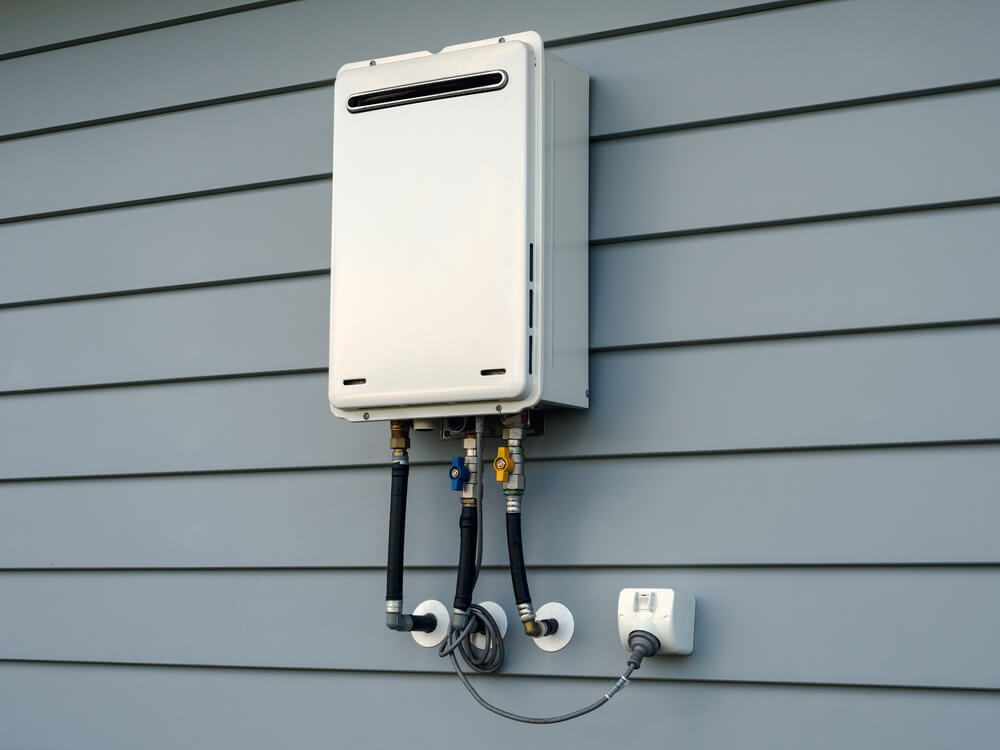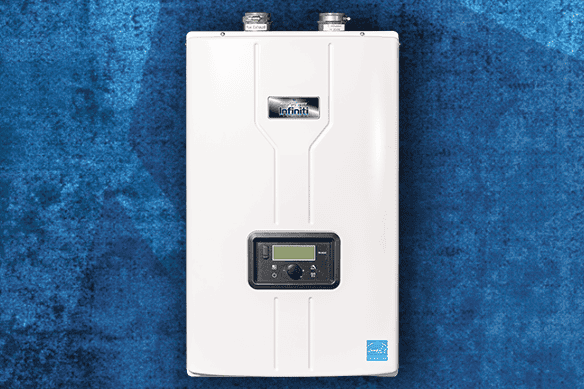Discovering The Advantages Of Continuous-Flow Water Heaters
Discovering The Advantages Of Continuous-Flow Water Heaters
Blog Article
Any individual maintains his or her own thinking when it comes to Unveiling the Hot Trend: The Benefits of Tankless Water.

In a globe where comfort and efficiency reign supreme, it's not a surprise that home owners are continuously in search of smarter ways to handle their home's power usage and convenience. One innovation that has progressively acquired popularity is the tankless water heater. But what exactly makes these systems stand out from the standard tank-based versions the majority of us grew up with? Let's dive in and discover the benefits of tankless water heaters, assisting you make a decision if it's time to make the switch in your house.
Introduction
Image this: you step into the shower after a lengthy day, expecting a soothing waterfall of hot water, just to be greeted by icy beads since the last person used all of it up. Noise familiar? Conventional hot water heater save a fixed quantity of warm water, suggesting you're at the grace of that storage tank's supply. Tankless systems, on the other hand, warm water as needed. No more running out mid-shower, no more wrestling with timetables simply to guarantee warm water is readily available.
Understanding Tankless Water Heaters
What Are Tankless Water Heaters?
Tankless water heaters, in some cases known as on-demand or instant hot water heater, provide warm water just as it's needed. Instead of saving gallons of pre-heated water, these devices kick right into action the minute you activate the faucet. Water goes through a heat exchanger, warming up in real-time, suggesting you obtain a continuous flow of hot water without the requirement for a big storage tank sitting idly by.
How Do They Differ from Standard Solutions?
Traditional heating units hold a reservoir of hot water, using energy to keep that tank at a regular temperature level. Tankless devices eliminate the standing supply, cutting down on squandered power and the bulky impact of a huge cyndrical tube. Basically, you're upgrading from a "accumulation" frame of mind to a "made-to-order" method.
Usual Kinds Of Tankless Devices
Tankless water heaters normally can be found in 2 selections: gas and electric. Gas models tend to deliver greater circulation rates, suitable for bigger families, while electrical designs usually offer smaller homes and are usually simpler to install. In addition, some systems are created for point-of-use (serving one fixture) while others can manage the whole home's warm water requirements.
Secret Benefits of Tankless Hot Water Heater
Power Efficiency and Price Financial Savings
No more heating a titan tank's well worth of water and keeping it cozy throughout the day. Tankless heating systems decrease standby power losses, which can lower utility expenses. While the first cost could be higher, the long-lasting financial savings frequently validate the financial investment.
3. Space-Saving Layout
If your home is short on storage space, getting rid of the bulky container liberates beneficial area. Tankless units are small and can frequently be installed on walls, hidden in corners, or set up in tight utility storage rooms without gobbling up the entire room.
4. Longer Lifespan
A properly maintained tankless hot water heater can outlive its tank-based cousin. Traditional containers might last 10-15 years, while tankless designs can keep chugging along for 20 years or even more, making them a strong investment in time.
1. Endless Warm Water Supply
Ever before had to set up showers so everybody obtains their fair share of warm water? With tankless, that ends up being a distant memory. As long as the heater's circulation capacity isn't surpassed, you can take back-to-back showers without developing into a popsicle.
5. Improved Water Quality
Keeping water in a storage tank can often lead to sediment build-up or a somewhat "off" preference. With tankless systems, fresh water is heated up on the spot, lowering the chances of sediment build-up and possibly supplying cleaner-tasting water.
Factors to consider Prior To Changing
Though the benefits are engaging, it's important to think about a few elements before totally devoting.
Reviewing Your Home's Water Usage Patterns
If your home at the same time uses multiple fixtures with high warm water need, ensure the device's circulation rate fulfills your requirements. Understanding your use patterns assists you select the best dimension and type of tankless heating unit.
Upkeep and Treatment Tips
Tankless systems are fairly reduced upkeep, but they aren't set-it-and-forget-it home appliances.
Normal Cleansing and Descaling
Hard water minerals can build up in the warmth exchanger, affecting effectiveness. Normal descaling (frequently recommended each year) maintains the device going for peak performance.
Annual Professional Inspections
A yearly checkup from a professional ensures minor concerns are captured early. They'll assess the device's efficiency, search for leakages, and assist maintain optimum efficiency.
First Investment Prices
Tankless heating units usually come with a higher upfront price tag. Between the device itself and possible setup modifications, the first price may give you sticker label shock. But remember to see it as a long-term financial investment.
Setup Requirements
Depending upon your home's infrastructure, you may need extra electric capability or gas line upgrades. Guarantee you recognize the installation demands and talk to a professional to avoid surprises.
Guaranteeing Correct Air Flow
For gas designs, appropriate air flow is important to securely get rid of exhaust gases. Make sure airing vent systems are clean and properly set up to stop any potential security dangers.
Comparing Different Brands and Designs
Not all tankless water heaters are created equivalent.
Looking Into Reliable Manufacturers
Seek reliable brands with a background of generating quality devices. A reputable manufacturer commonly provides much better customer assistance and longer service warranties.
Installation: Do It Yourself or Specialist?
While some house owners enjoy taking on jobs themselves, tankless installment could not be the very best time to burst out the tool kit.
Pros and Cons of Do It Yourself Installation
A DIY install can conserve money, but it comes with dangers. Inaccurate installment can result in ineffectiveness or security worries. If you're handy and have experience, it may be feasible-- however proceed with care.
Reviewing Reviews and User Responses
User evaluations and comments from neighbors or friends that have actually gone tankless can provide important insights. Sometimes, real-life experiences can be more informing than advertising and marketing sales brochures.
When to Call an Expert Plumbing Technician
For many, calling a professional makes sure everything's done appropriately. An expert plumbing professional comprehends local codes, sizing needs, and venting specifications, lowering the threat of incidents.
Making the most of Effectiveness
You have actually bought a tankless device-- now maximize its efficiency.
Ideal Temperature Settings
Most individuals establish their units between 120-140 F. Adjusting the temperature can improve convenience and savings. Experiment to discover a pleasant area that does not squander power.
Pairing with Low-Flow Fixtures
Intend to stretch your system's capabilities? Take into consideration setting up low-flow showerheads and taps. They lower water usage, allowing your tankless system to supply a constant stream of warm water without stressing.
Environmental Influence
Tankless hot water heater straighten with greener living goals.
Decreased Carbon Footprint
By using less energy and only heating water as required, tankless systems can decrease your home's carbon impact, lowering your ecological influence.
Saving Natural Resources
Less power intake and much less thrown away hot water equate into fewer natural resources being used, an environmental win-win.
Who Benefits Many from Tankless Heating systems?
The beauty of tankless heating units is that they can fit a range of houses.
Large Families vs. Single Passengers
Big households might like the unlimited hot water supply, while single residents appreciate the energy cost savings from not heating up an entire tank for simply someone's early morning shower.
House Owners with Minimal Room
If your home is short on square video footage, losing the bulky tank maximizes space for various other essentials-- or perhaps simply extra elbow room.
Eco-Conscious Consumers
Going tankless aligns with environmentally friendly worths, guaranteeing you're not throwing away energy or resources.
Future Trends in Tankless Hot Water Heater
The globe of home devices is ever-evolving, and tankless hot water heater are no exemption.
Developments in Technology
R&D is regularly improving warmth exchangers, making systems much more efficient and resilient. Future models may be even quieter, much more compact, and better fit for varying climates.
Smart Home Assimilation
Envision readjusting your hot water heater's temperature level using an application or obtaining upkeep signals on your phone. As clever home technology advances, we'll see even more connection and comfort.
Conclusion
Choosing a tankless hot water heater is greater than just upgrading your home's warm water system; it's purchasing lasting comfort, energy performance, and a greener way of life. By considering your household's water use, being mindful of setup requirements, and dedicating to normal maintenance, you can delight in a constant stream of hot water without the luggage of a cumbersome container. As modern technology progresses, you can eagerly anticipate also smarter, extra reliable tankless services that not only make your life much easier yet likewise profit the earth.
Six Benefits of a Tankless Hot Water Heater
Continuous hot water. Large families know what a pain it is to hop into the shower and get blasted with cold water. With a tankless hot water heater, this doesn't happen as long as you install the right size tank. Even if you don t have a large family, a tankless hot water heater allows you to use multiple appliances at once without running out of hot water. Reduced energy bill. Because tankless heaters are essentially "off" when the water tap is not on, they use less energy overall. In fact, an ENERGY STAR-qualified tankless hot water heater can use 25-40% less energy than a conventional water heater, and save the average family $100 or more annually. Longer life. Get more bang for your buck with a greater lifespan. Specifically, conventional hot water heaters last about 10-13 years compared with up to 20 years for a tankless hot water heater. Less space. Did you know that tankless hot water heaters can be hung on a wall almost anywhere in your home? Plus, at 28" tall by 20" wide and 10" deep, a tankless hot water heater takes up a lot less space than a conventional hot water heater, which is 60" tall and 24" wide. Good for the environment. In addition to reducing the amount of energy used, most propane-fired tankless water heaters are made of recycled materials. Many conventional tanks, on the other hand, go directly to the dump once they've served their purpose. High safety ratings. Conventional water heaters are "always on" and thus pose safety risks more often than do tankless heaters, which only operate when warm water is needed. https://www.rotorooter.com/blog/water-heaters/six-benefits-of-a-tankless-hot-water-heater/

I am very eager about and I really hope you enjoyed the post. Enjoyed reading our content? Please quickly share it. Let somebody else locate it. Thank you so much for your time invested reading it.
Hire A Pro Report this page